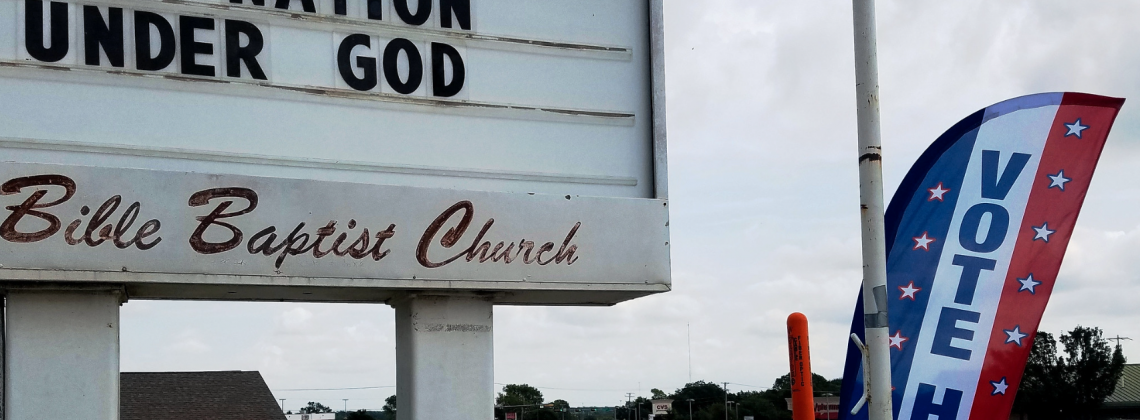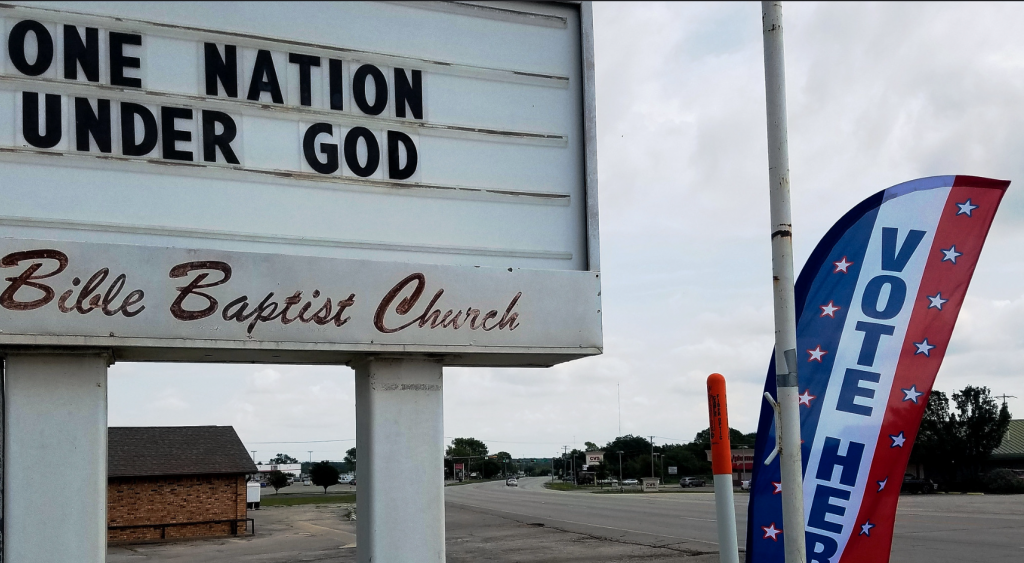

On the common agenda of Seven Mountain Dominionists and National Conservatives
The debate over the relationship between Christianity and the American founding has once again reached a fever pitch in recent months. Much of it centers around the idea of “Christian nationalism.” Academics and pundits see this brand of nationalism as a threat to a secular nation built on the separation of church and state. Conservative politicians regularly fuse Christianity and national identity or put forth innovative interpretations of biblical passages with which to assault “the Left.” These politicians once rejected the label “Christian nationalism.” Now many of them embrace it wholeheartedly.
Christian nationalism is built on the idea that the United States was founded as a distinctly Christian nation. Its proponents appeal to the past, but they are not historians. They are political activists. They are not particularly interested in the complexity of the past. They only care about raiding it for what they need to advance their political agendas. Any attempt to understand the history of the founding in all its fullness would only weaken their arguments in the present. (This search for a usable past, I might add, also plagues activists on the Left.)
Last weekend an assorted group of charismatic preachers, prophets, and pundits, along with one United States congresswoman, came to Charis Bible College in Woodland Park, Colorado for the annual meeting of the Truth & Liberty Coalition. Speakers included New Apostolic Reformation prophets Mario Murillo and Lance Wallnau, Christian Right radio host and author Eric Metaxas, Christian nationalist historians David Barton and William Federer, and Colorado congresswoman Lauren Boebert. In addition to their commitment to Christian nationalism these speakers share a common love of Donald Trump and Trumpism.
The central theme of this conference was something called “Seven Mountain Dominionism.” Those who adhere to this doctrine believe that God is calling them to take control of the so-called “seven mountains” of cultural influence: business, government, media, arts and entertainment, education, family, and religion. Their mandate comes from Isaiah 2:2: “Now it shall come to pass in the latter days that the mountain of the Lord’s house shall be established on the top of the mountains.” The Seven Mountain Dominionism preached in Woodland Park last weekend fused a theocratic version of evangelical Christianity with the belief that the United States was founded as a Christian nation but has since lost its way. It thus needs to be restored once again to its Christian roots, and it is God’s will for believers to work toward this restoration.
Earlier this week, Christian nationalism came to Miami in the form of the annual meeting of the National Conservative movement. Speakers at this event included Florida governor Ron DeSantis, Missouri senator Josh Hawley, Southern Baptist Theological Seminary president Albert Mohler, Florida senators Marco Rubio and Rick Scott, and tech investor Peter Thiel. The central message in Miami differed little from the charismatic evangelical gathering at Charis Bible College: America was founded as a Christian nation and the restoration of America to the spiritual and theological values is our only hope of saving the country from cultural Marxism, critical race theory, and secularism. The presence of conservative intellectuals—Michael Anton, Hadley Arkes, Rod Dreher, Paul Gottfried, Yoram Hazony (the conference organizer), Michael Lind, Wilfred McClay, R.R. Reno, and John Yoo, to name a few—gave the event an air of respectability that was absent from the ranting and raving in Woodland Park.
So was America founded as a Christian nation? Here are some starting points for those interested in exploring this question more deeply.
First, those who believe the United States is a Christian nation have a good chunk of American history on their side. Throughout the nineteenth and twentieth centuries and into the twenty-first century there have always been believers who have tried to promote this idea. In the early nineteenth century such a view was part of the cultural mainstream. In other words, most Americans believed that they were living in a Christian nation. Though the Constitution would always prevent the United States from making Christianity its established faith, the religious culture of pre-Civil War America was shaped by evangelical Protestantism. It is even plausible to suggest that the Civil War was, at one level, a war over just what kind of Christian nation America would be.
As the United States entered the twentieth century, the meaning of the phrase “Christian nation” became a contested one. Conservative evangelicals and liberal Protestants fought diligently for what they believed to be the Christian soul of the nation. Meanwhile, Catholics were offering their own vision of the United States as a Christian nation, a vision that posed a threat to Protestant hegemony.
In the wake of the turbulent 1960s and a series of Supreme Court decisions that seemed to be removing Christian values from the public square, the Christian Right emerged in American political culture and led the charge in advancing the idea that the United States was founded as a Christian nation and should continue to be one.
Second, it would be difficult to suggest, based upon the formal responses to British taxation between 1765 and 1774, that the leaders of the American Revolution were driven by overtly Christian values. Ministers used the Bible extensively to justify rebellion against England, but their interpretations of the scriptures were more informed by popular political ideas of the day than by sound theological reflection and exegesis. Though the Declaration of Independence refers to God multiple times, it does not offer any explicit Christian theology. The same might be said for the United States Constitution, which refers to God not at all.
Third, the founding fathers were an eclectic religious group. Some claimed to be Christians but rejected doctrines that are central to historic Christian orthodoxy, such as the inspiration of the Bible, the resurrection of Jesus Christ, or the Trinity. Other exemplified behavior that might lead one to question the depths of their Christian commitments. And others were devout believers who tried to bring their faith to bear on their vision for the new nation they helped to found. They believed in religious freedom and thought that religion and morality were essential to sustain an ordered republic.
We live in a free country. Christian nationalists, national conservatives, and Seven Mountain Dominionists are free to advance their agendas. But stop cherry-picking from the past to do it. The human experience and ideas that informed the founding of this country do not fit easily with contemporary political agendas. The relationship of the past to the present is complicated. Historians embrace this complexity. Political activists do not.
John Fea is Executive Editor of Current. He is the author of Was America Founded as a Christian Nation?: A Historical Introduction .